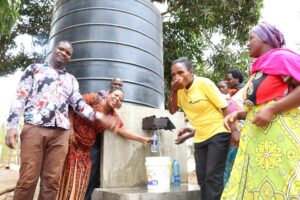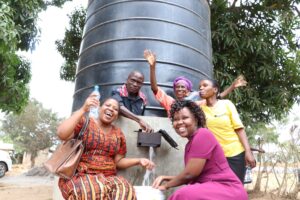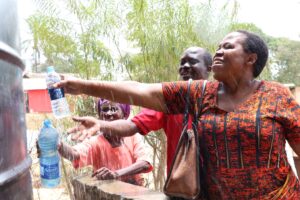Hotline: 0800 722 970
/ Info: 0708555666
- Email: info@amurtafrica.org
- Address: 209 Mountain View Estate, Nairobi
Hope has been like the sun to Stacy because her journey has cast a shadow of burden behind her. If it were not for hope, her heart would have broken by now. Growing up in Mathare slums in Nairobi County was a constant struggle for the 19 year-old Stacy Akinyi. She is the youngest in a family of four and lives with her mother, who sells cereals for survival. Her father succumbed to HIV/AIDS in the year 2010. Since then, her mother has been the sole breadwinner in the family. Stacy’s elder sister, Monica, who used to work as a receptionist, lost her job and has since been diagnosed with depression. She has been in and out of the psychiatric hospital. Her two brothers are married and work as casual laborers with no stable income; hence, they do not assist their mother financially. For Stacy, going without meals has always been a reality of life. Their landlord often put a padlock on their door because they could not raise Ksh 1,500 for rent.
For Stacy, going without meals has always been a reality of life. Their landlord often put a padlock on their door because they could not raise Ksh 1,500 for rent. Stacy attended secondary school thanks to a bursary fund and contribution from her local church. At some point, Stacy was forced to drop out of school. She was employed at an illicit brew den to earn some money to help her mother financially. Male customers would make sexual advances on her to try to lure her into transactional sex. Fortunately, she did not give in to their advances.
She completed her form four education in 2015, but was unable to collect her Kenya Certificate of Secondary Education (KCSE) because she could not pay the Ksh 7,000 fee.
Story
Stacy caught wind of the Ananda Marga Universal Relief Team’s (AMURT) DREAMS Ajiri Dada project from a peer educator engaged by the project to create awareness and mobilize adolescent girls and young women. She knew the peer educator, who had watched her family struggle for more than a decade. Based on her vulnerable situation, the peer educator recommended her to the project. After carrying out an assessment and home visit, she found Stacy eligible to join the Ajiri Dada project.
Though her friends discouraged her from taking a course in professional housekeeping, as it is seen as a job for the illiterate and lower cadre in society, she did not give into their influence.
Stacy completed the one-month professional housekeeping course and graduated in March, 2017. Immediately after the training, while awaiting graduation, she was placed in a job at a high-end estate in Nairobi where she earns a salary of Ksh 10,800 every month.



Outcome
Stacy has worked for four months now. She saves Ksh 4,000 per month. With this money, she has managed to pay off her debt of Ksh 7,000 to Kola Girls in Machakos, enough to collect her certificate.
On June 15, 2017, Stacy enrolled in a three-year Diploma course in mass communication at the Nairobi Institute of Professional Studies, as a part-time student. The annual school fee is Ksh 91,000. Stacy will raise part of the money and her employer, as promised, will cover part of the fee.
“My employer has promised to help pay my school fees. I am pursuing a Diploma in Mass Communication to better my life. I am proud to be from the slum and am willing and determined to work my way out of here. I am determined to move my mother out of the slum” -Stacy Akinyi
She also helps pay her mother’s house rent of Ksh 1,500 per month and assist her sister with getting medical checkups and medication. “I am very grateful and proud of Ajiri Dada project and AMURT for the opportunity,” she says. “This project has changed me as a person, and I am proud to say that we do not lack at home” Stacy has also managed to send her sister’s young son to school. Previously, her nephew was unable to enroll in school due to financial constraints.
Stacy says that though there are a lot of stereotypes about housekeeping in the slum, she is proud and intends to do this job as long as she can, despite the fact that her peers look down on her “The girls here in the slum call me a maid, but I am very proud of the fact that I am not dependent on anyone, especially men,” she says. “I encourage all the young girls in the ghetto to join Ajiri Dada project and better their lives and that of their families. Housekeeping is a job like any other, and they should not look down on it. I encourage them to just be focused on what they want to achieve and not listen to the discouraging peers. “Stacy affirms that she has seen some of her peers engage in unprotected sex and end up being teenage mothers, while others have also contracted HIV/AIDS. She says she doesn’t want to follow that path.